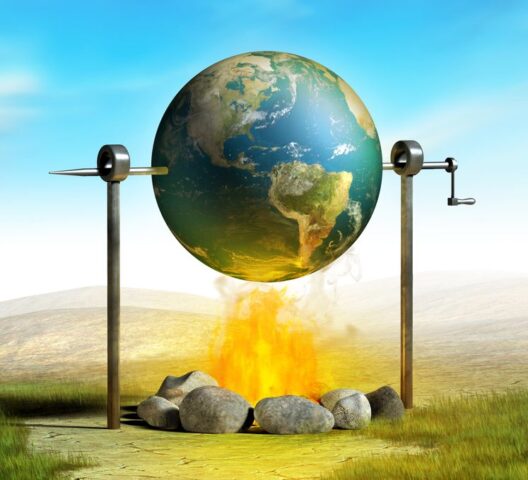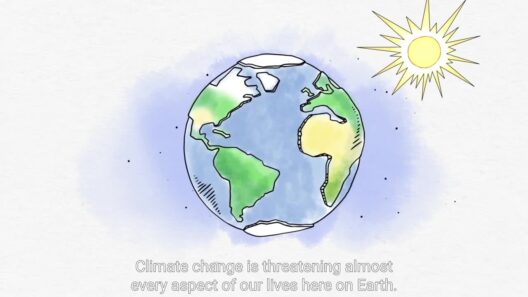In the grand tapestry of Earth’s climatic existence, we find ourselves at a crucial juncture, resembling a ship teetering on the brink of an uncharted tempest. The question looms large: Is it too late to stop global warming—or can we still act? To grapple with this dilemma, we must delve deep into the complexities of climate science, societal dynamics, and the potential pathways forward.
The reality of climate change is akin to an encroaching shadow. It is not a distant threat but a palpable menace that is reshaping ecosystems, exacerbating weather phenomena, and presenting existential challenges to human civilization. A plethora of scientific data underscores that temperatures are rising at an alarming rate, surpassing 1.1 degrees Celsius above pre-industrial levels. This seemingly innocuous figure, however, belies a cataclysmic transformation in our environment. The repercussions of this warming manifest in the form of more frequent and severe hurricanes, droughts, and floods. The metaphorical ship of humanity is indeed navigating turbulent waters.
The notion of irreversibility looms heavily in discussions about climate change. Scientists often caution that certain threshold events may lock in detrimental changes, making it exceedingly difficult—if not impossible—to revert to a stable climate. This phenomenon is evident in polar ice melting and the release of methane from thawing permafrost, which furthers the greenhouse gas effect, trapping heat and perpetuating the cycle of warming. The warning bells are ringing louder, prompting deeper introspection: are we already trapped in a cycle from which there is no escape?
Despite the gravity of the situation, dismissing the possibility of action would be a grave misstep. Humanity’s ingenuity and resilience have historically triumphed in the face of adversity. Though the hourglass is swiftly draining, avenues remain for mitigating the impacts of climate change. It is important to acknowledge that the collective will and coordinated efforts can shift trajectories, akin to adjusting the sails of our ship to harness winds of change.
One of the most powerful strategies in combating climate change is the transition to renewable energy sources. The fossil fuel era, characterized by its carbon-spewing engines, must yield to a paradigm steeped in sustainability. Solar, wind, and hydroelectric power present not just alternatives, but vital lifeline solutions that can sculpt a cleaner, more resilient energy landscape. By harnessing natural processes, we can champion an electricity grid that emits minimal carbon, fundamentally altering our relationship with energy consumption. Imagine a world where wind turbines gracefully dot the landscape, silently powering our lives while nurturing the planet.
Moreover, energy efficiency must become the lodestar guiding our actions. Implementing energy-efficient technologies in our homes, industries, and transportation can cut emissions drastically. Building codes can evolve, incorporating designs that maximize sustainability. Vehicles can be electrified, pushing cars into a more eco-friendly future. This journey towards efficiency reflects the ethos of pragmatism, showcasing that every small effort contributes to the monumental task of climate stabilization.
Deforestation and land use change stand as critical adversaries in the climate battle. Forests act as the lungs of the Earth, absorbing carbon dioxide and sheltering biodiversity. The preservation and restoration of these vital ecosystems are essential. Initiatives such as reforestation and afforestation must be prioritized, akin to planting seeds of hope in a parched soil. These measures not only sequester carbon but also fortify the resilience of our natural landscape.
The agricultural domain, often overlooked, harbors immense potential for climate action. Transitioning to sustainable practices, such as regenerative agriculture, can enhance soil health and reduce greenhouse gas emissions. The interplay between healthy soils and a stable climate echoes the harmony found within nature—a symbiosis wherein both agriculture and the environment thrive.
However, individual action, while laudable, cannot replace the necessity for systemic change. Policymakers and leaders must be held accountable to enact robust legislation aimed at curbing carbon emissions. Climate policies that commit to net-zero emissions, implementing carbon pricing, and subsidizing green technologies are paramount. The transition should not be merely aspirational but embedded in the fabric of governance—creating a framework that supports sustainability across all sectors.
Education plays an equally pivotal role in this transformative journey. A well-informed citizenry is an empowered one. Environmental education can cultivate a sense of stewardship and responsibility. Communities armed with knowledge can engage in advocacy, pushing for meaningful policy changes. The ripple effect of awareness can transcend geographical and social boundaries, illustrating how interconnected we truly are in this global struggle.
As the ship of humanity navigates these tumultuous waters, it is crucial to foster a narrative of hope and resilience. The climate crisis is not merely a burden but an opportunity—one that challenges us to innovate, collaborate, and reimagine our existence on this planet. The resilience of the human spirit has historically triumphed in the face of daunting challenges, and this time must be no different.
Every decision we make today reverberates into the future. Is it too late to stop global warming? While the winds may seem adverse, there is still time to alter our course. The future remains unwritten, and collective action can reshape our destiny. The fight against climate change is an ongoing odyssey, one that requires a concerted, multifaceted approach. The question is not whether we will act but how we will choose to navigate the next chapter of our shared story. The ship awaits—will we steer it towards a sustainable horizon?







